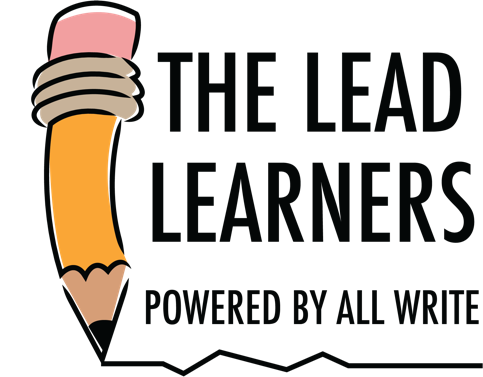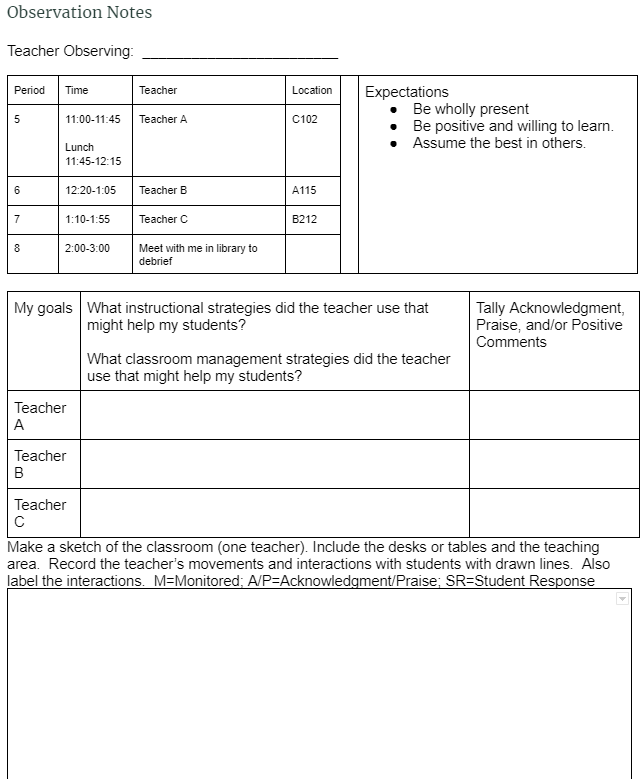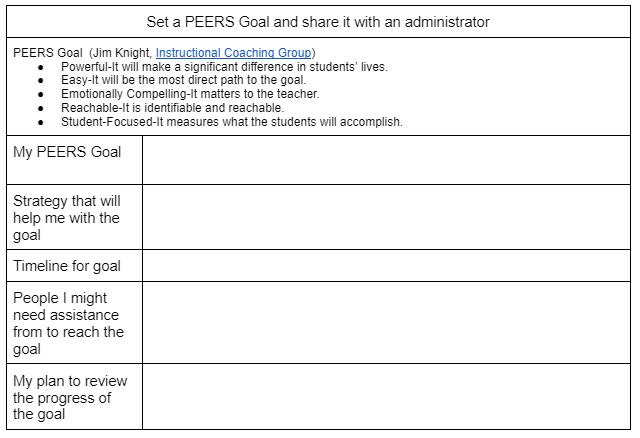Believe you can and you’re halfway there.
—Theodore Roosevelt
Confidence is a necessary part of our profession. Let’s face it: When we are in front of multiple groups of dynamic students throughout the day, we have to portray some sense of confidence. If we don’t, well, we’ve all been there. It is often the confidence we have gained that gives us the ability to handle those challenging situations.
How do we continue to build the confidence of seasoned teachers who have maybe not been “seen” by their peers or administrators? How do we encourage them to continue to grow when they feel stretched to their limits? How do we build the confidence of new teachers who are overwhelmed by the demands of the profession they thought they were going to love?
Recently, I asked a colleague if he would be interested in observing a few teachers in another building. At first, he was hesitant. I could see in his expression that he didn’t understand why I had asked him to observe another teacher. What am I doing wrong? Why are you picking on me? His eyes questioned me, but after some discussion, he was willing to put himself out there. What happened was a chain of events that benefited multiple teachers across our district.
The Observer
Before asking a teacher if he is interested in observing another teacher, it is important to have built a relationship with him. Trust is a foundation for building confidence. I had several conversations with this teacher about his goals, and I had observed in his classroom before I suggested he observe at the high school.
Based on his goals and our discussions, I thought an observation with some specific teachers might help him hone his own skills. He accepted, and we began by discussing his goals for the observation. Using the Observation Notes document, we wrote the goals for his observation. This helped him take ownership in the process. I then went to work thinking about who might best fill the needs of this particular teacher.
The Observed
Choosing teachers to be observed can be tricky. At first, it is important to take care of logistics. I wanted to clear these observations with administrators and make sure they knew there would be other teachers in the building. One administrator had definite suggestions for who my observer should observe. “Sure—he should spend some time in Teacher A’s classroom. She is excellent.” Although Teacher A is an excellent teacher, she is often asked to serve in many teacher-leader roles. It sometimes reminds me of when we were in school and the same student was chosen, time after time, as the team captain or leader of the group. Sometimes, we as teachers or administrators fall into the same rut.
Teacher A did end up on the list of teachers to observe, but we also chose two others who were valuable to us for other reasons. When I asked the two others if a colleague could observe their classrooms, they were a bit shocked. They were hardly ever asked to be in a leadership role. They immediately jumped on board. They wanted to know about the goals and how they might be able to help. They were all in.
While we might not get this reaction every time from teachers who are not typically put in positions of leadership, it can definitely be worth the ask. Sometimes teachers just need to be seen. Sometimes they just need to be asked. Sometimes they just need to know that someone out there values their contribution.
Build Them Up
There were several brief but important meetings before and after the observations. All involved—the observer and those observed—had a copy of the Observation Notes document. All understood that the observations were being conducted to help a colleague. All agreed to be a part of the process and to take it seriously. All understood the expectations.
- Be wholly present.
- Be positive and willing to learn.
- Assume the best in others.
I met the observer at the door and gave him a quick tour of where he would need to go throughout the day. Then, I walked him to Teacher A’s room. After a brief introduction, Teacher A asked the observer to take his seat with a group of students where he would be participating in the lesson. The observer made his way through the rest of the day on his own without any issues, and we met in the library at the end to debrief.
The debrief is crucial. Too often, we don’t take the time to reflect on our own learning. I feel like this often when I attend a conference or workshop. After spending time with colleagues and presenters, I often just want to get to the hotel, find something to eat, and crash. I’ve found I have to force myself to reflect on the day before I go to bed to truly digest the day’s learning. Therefore, at the end of the day, the observer and I meet in the library to reflect on the observations.
First, I asked what he noticed. I encouraged the observer to lead the discussion. Classroom management usually comes up first. We looked at the map and how the teachers interacted with the students. Then, we discussed his goals and the ideas he obtained from the different teachers. At the end of the debrief, I asked if he had one takeaway, and I encouraged him to set a PEERS goal.
Becoming Teacher Leaders
I am convinced that we need to build more leaders in our profession. We all know our teacher teams are often a reflection of our own school experience. As students, we knew who was going to be the discussion leader. Heck, it was often one of us. Sometimes we were chosen; sometimes we volunteered. We always wanted to be successful and made sure—even at our own expense—that we were.
As teachers, we often fall into that old habit. Those who led then often continue to lead now. Why is that? Is it just part of who we are innately? Are we just more comfortable with the roles we’ve grown up with? And how do we grow leaders if we resist change? We know that John Hattie found that Collective Teacher Efficacy, “the collective belief of teachers in their ability to positively affect students,” has a huge effect on student achievement. Would that not also hold true for teachers? Encouraging teachers to believe they can might be the catalyst they need to grow and lead.





